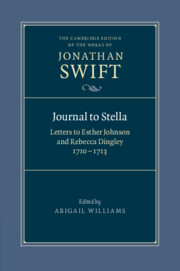Book contents
- Frontmatter
- Contents
- List of Illustrations Page
- General Editors’ Preface
- Acknowledgements
- Chronology
- List of Abbreviations
- Introduction
- Calendar of Letters
- Letters to Esther Johnson and Rebecca Dingley, 1710–1713
- Appendices
- A Swift, Harley, St John and the Political Debates Behind the Journal to Stella
- B Surviving Letters to and From Esther Johnson and Rebecca Dingley
- C Letter 2 in Print and Manuscript
- D Facsimile of Letter From Esther Johnson and Rebecca Dingley to Robert Dingley
- E Glossary of Little Language Used in the Journal to Stella
- F Biographical Appendix
- Textual Account
- Bibliography
- Index
F - Biographical Appendix
Published online by Cambridge University Press: 02 September 2021
- Frontmatter
- Contents
- List of Illustrations Page
- General Editors’ Preface
- Acknowledgements
- Chronology
- List of Abbreviations
- Introduction
- Calendar of Letters
- Letters to Esther Johnson and Rebecca Dingley, 1710–1713
- Appendices
- A Swift, Harley, St John and the Political Debates Behind the Journal to Stella
- B Surviving Letters to and From Esther Johnson and Rebecca Dingley
- C Letter 2 in Print and Manuscript
- D Facsimile of Letter From Esther Johnson and Rebecca Dingley to Robert Dingley
- E Glossary of Little Language Used in the Journal to Stella
- F Biographical Appendix
- Textual Account
- Bibliography
- Index
Summary
NOTE ON SOURCES: Biographical information is usually taken fromODNB, unless otherwise specified. The principal sources for each entry other than ODNB are indicated at the end of the individual entry.
Adams, John (1662–1720), college head. Educated at Eton College and King's College, Cambridge. Travelled in France, Italy, Spain and Ireland, and became an accomplished linguist. Rector ofHigham, Leicestershire, 1687; rector of St Alban, WoodSt, and St Bartholomew, London, in 1694; prebendary ofCanterbury, 1703; canon of Windsor, 1708. Served as chaplain to William III and Anne. Rector of Hornsey, Middlesex, 1711; provost of King's College, 1712; Vice-chancellor of the University of Cambridge, 1712–13.
Addison, Joseph (1672–1719), essayist, poet and statesman. Educated at Charterhouse School, and Queen's College andMagdalen College, Oxford. Supported and patronised under William and Anne by the Whig Junto. Wrote his most celebrated poem, The Campaign, on the victory at Blenheim in 1704. Made undersecretary of state, then commissioner of appeals; MP for Lostwithiel in 1708. Lost office on fall ofWhigs in 1710. Contributed to The Tatler, and began The Spectator in March 1711. Member of the Kit-Cat Club, he also presided over a group of young Whig writers at Button's Club in London. Produced Cato in 1713, and became engaged again with essay writing with The Guardian in 1713. Returned to politics on the death of Queen Anne, and became secretary to the Lords justices, then secretary of state, along with Stanhope, in 1717. Retired 1718, fell out with Steele and died shortly after, in 1719. Swift may have met him on his previous visit to London.
Alexander, Henry, fifth Earl of Stirling (1664–1739). The Earls of Stirling were titular hereditary lieutenants-general of Nova Scotia, although the territory had been ceded to France in 1632. The family fortune, reputed large by the fifth Earl's death, was based on marriages into London merchant families. [Complete Peerage]
Annesley, Arthur, fifth Earl of Anglesey (1676–1737), politician. Educated Eton and Magdalene College, Cambridge; MA, 1699; elected to a college fellowship, 1700. Married his cousinMary in 1702, electedMP for University of Cambridge the same year and secured election to the borough of New Ross in 1703.
- Type
- Chapter
- Information
- Journal to StellaLetters to Esther Johnson and Rebecca Dingley, 1710–1713, pp. 578 - 696Publisher: Cambridge University PressPrint publication year: 2013

